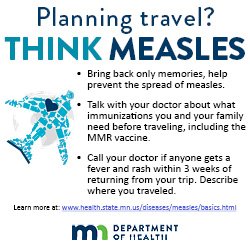Think Measles Before and After Traveling
Measles is a highly contagious disease that is spread through the air when an infected person coughs or sneezes. Measles can be especially severe in persons whose immune systems are weak. Children are most often at risk of getting measles and getting severe disease.
Before travel
Before heading out of Minnesota, check to be sure you and family members have received the measles, mumps, and rubella (MMR) vaccine. If you’re unsure check with your doctor. Measles is common in many areas of the world. Your doctor can also make sure you and your family are up to date with all your vaccinations, so you can travel with ease of mind.
After travel
The early signs and symptoms of measles can be minor and sometimes mimic other illnesses, like a cold, but it can be a serious disease that can lead to hospitalization and even death. Many people with measles have complications like diarrhea, ear infections, pneumonia, or acute encephalitis (a brain infection that can lead to permanent brain damage). Complications are more common in children under 5 years of age and adults older than 20.
If you have recently traveled or have been in contact with a person who has measles, and have any of the following:
§ Fever, with temperature over 38°C (100.4°F)
§ Cough
§ Runny nose
§ Sore, red eyes
§ Rash
Call your clinic and follow your doctor’s instructions. They will need to take special care, so measles doesn’t spread to others.
Prevent measles and talk to your health care provider about MMR and other vaccines that are needed.
To get vaccinated, contact your health care provider to schedule an appointment. If your child does not have health insurance or a health care provider, visit Free or Low-Cost Shots for Children (www.health.state.mn.us/people/immunize/basics/howpay.html) for more information and to find clinics that offer free or low-cost vaccines. For more information about measles, visit Measles www.health.state.mn.us/diseases/measles/basics.html




